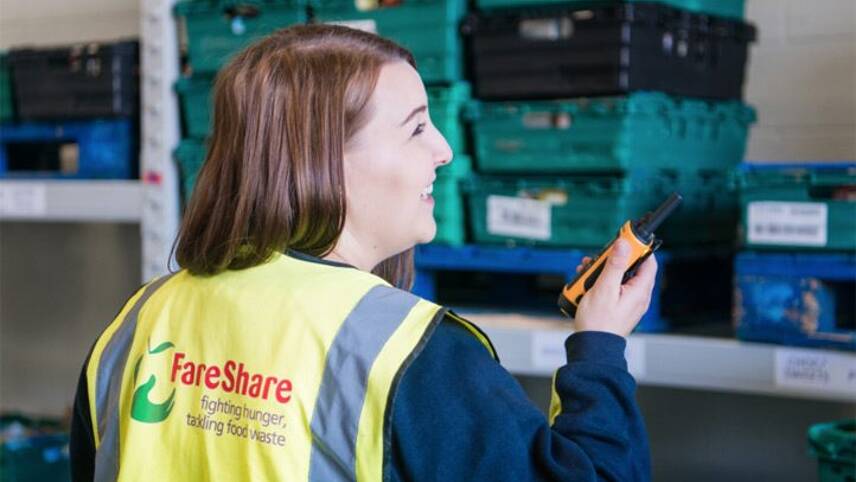Register for free and continue reading
Join our growing army of changemakers and get unlimited access to our premium content

Both Tesco and Cranswick work with FareShare to help redistribute surplus products
Back in 2017, Cranswick unveiled an ambition to halve food waste and loss across its entire upstream value chain and operations by 2030. This target was created in line with the Sustainable Development Goals (SDG) – specifically Goal 12.3. It has now revealed that monthly food waste levels are 61% lower than when the target was set.
The reduction means that Cranswick is operating at a wastage rate of just 0.4% and that more than 4,200 tonnes of food waste have been avoided over the past three years. The firm attributes its success to a multi-faceted approach, combining investments in new technologies and processes that drive efficiency to better redistribution schemes for surplus products. On the latter, the firm works with food sharing app OLIO, social enterprise FULL and the Hull Food bank to combat both food waste and the root causes of food poverty near its UK headquarters.
Cranswick is now working to become a zero food waste business by the end of the decade, excluding inedible parts. The company’s chief operating officer Chris Aldersley said that surpassing the original target “so substantially” “gives confidence” that the vision is achievable.
“We need to get even more resourceful as we strive to get to zero edible food waste, which I am sure we will do with the support from the incredible people across our business,” he said.
Tesco, meanwhile, has published its own food waste data for the eighth year, revealing that it has prevented 200,000 tonnes of food from being wasted over the past three years.
Some 125,000 tonnes of this product is attributable to Tesco’s own-label suppliers, while 30,000 tonnes were saved across the operations 11 key third-party brands, including Unilever, Nestle, Coca-Cola and Kellogg.
When combined with the reductions achieved in Tesco’s direct operations, the figure means that Tesco has exceeded its own SDG 12.3-aligned target for 2030. The supermarket’s chief executive Dave Lewis is now calling on other large businesses in the food and drink sector to commit to SDG-aligned food waste targets and to publicly report on progress each year.
“We are also asking the UK government, and its counterparts around the world, to embed food loss and waste reduction into post-Covid plans to bolster supply chains, as well as strategies to meet commitments to the Paris Agreement on Climate Change,” Lewis added.
That’s a WRAP
Tesco is notably working with Defra on its ‘Step Up To The Plate’ pledge, which helps businesses and individuals align with SDG 12.3 and provides a platform for Ministers to receive recommendations for targeted policy support.
The pledge requires corporate signatories to adopt WRAP’s food waste reduction roadmap. The framework, built in partnership with charity IGD, sets out how organisations can measure and act on wastage levels across a “farm-to-fork” approach.
WRAP this week published its second annual progress report on the roadmap, revealing that 70 organisations have joined the initiative in the past 12 months. The newest signatories include Pret-A-Manger, Burger King UK and McDonald’s UK.
The report also reveals that that 171 businesses are disclosing food waste data to the charity. Of the members, 45 businesses have publicly reported on food waste in 2019 and provided historical data for comparison. An average year-on-year reduction of 17% was recorded and, according to WRAP, this is equivalent to £300m worth of food being diverted from waste.
While these achievements are promising – and food waste from all sources has decreased in recent years – a further 1.8 million tonnes of food waste will need to be prevented by 2030 if the UK is to align with SDG 12.3. WRAP believes that if 400 more businesses commit to the roadmap, this figure can be achieved.
The organisation is also calling for a number of other changes, including alterations to labelling in order to reduce confusion around ‘best before’ dates, and ‘use by’ dates and more uniform reporting of food waste data by businesses.
“The rest of the world is looking to the UK to continue to lead the way, and the stakes are too high in terms of the environmental, economic and social costs of food waste for us to fail,” WRAP chief executive Marcus Gover said.
Learn more about SDG 12.3 with edie’s Business Blueprint for the SDGs
Sustainability and CSR professionals looking to embed the SDGs – including SDG 12.3 – within their organisation’s strategy now have access to a comprehensive new report breaking down exactly how businesses of all sizes and sectors can contribute to all 17 Global Goals.
Hosted in association with UK Power Networks Services, the free report combines up-to-date facts and stats with expert insight and real-life case studies, breaking down everything there is to know about each of the Goals. Download and read the report here.
Sarah George


Please login or Register to leave a comment.